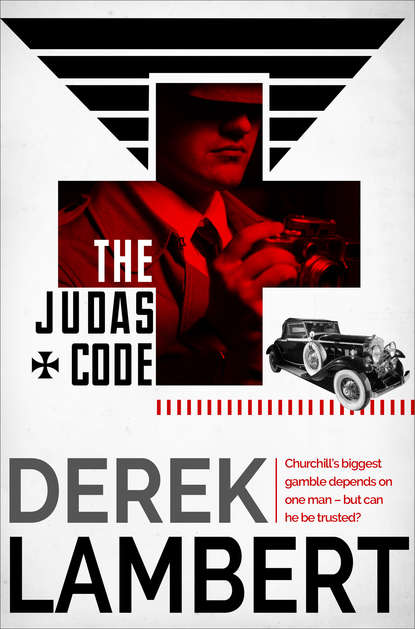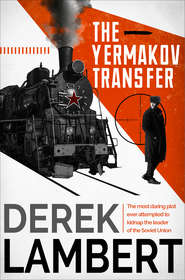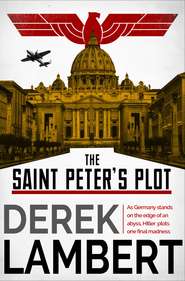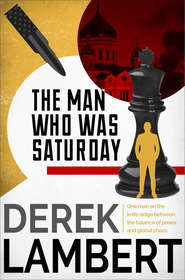По всем вопросам обращайтесь на: info@litportal.ru
(©) 2003-2024.
✖
The Judas Code
Автор
Год написания книги
2018
Настройки чтения
Размер шрифта
Высота строк
Поля
‘Not quite. We make a point of checking out Red Cross personnel. I admire your dedication, Mr Hoffman, but it’s not unknown for a few devils to flit among the angels of mercy.’
‘But I—’
‘We just checked you out, that’s all. Any more questions?’
‘Why did you shoot him? It was you, wasn’t it?’
‘As a matter of fact it wasn’t. Taft did the dirty work.’
‘Did you have to kill him?’
‘He was going to kill you. Don’t let that dedication of yours blind you to reality.’
‘And you think you’ll get away with it?’
‘I’m quite sure we will. There are a lot of unsolved murders in Lisbon these days as I’m sure you know. The PIDE can’t follow up the death of every stateless mid-European. Perhaps he had stolen someone’s family jewels, their papers, their seat on the Clipper …’ Cross spread wide his hands. ‘My turn again?’
‘What more questions can there be? I don’t know why he tried to kill me, nor do you.’
Cross leaned forward, grey eyes looking intently at Hoffman. ‘Novikov worked for the NKVD. Have you really no idea why the Russian secret police should be so anxious to remove you from the face of this earth?’
‘No idea at all,’ lied Viktor Golovin.
CHAPTER FOUR (#ulink_794d9fd3-22f2-5c7b-bb57-f0d60de3a714)
‘So,’ Churchill said to the tweed-suited man sitting opposite him on the lawns of Chartwell, ‘contact has been made in Lisbon?’
The man, who had fair hair needled with grey and a withdrawn expression that looked as though it had been recently but permanently acquired, nodded. ‘Some weeks ago.’
‘You didn’t inform me,’ Churchill said reprovingly.
‘With respect, Prime Minister,’ said Colonel Robert Sinclair, head of the Secret Intelligence Service, ‘you told me not to worry you with details. Only the grand stratagem.’
‘You’re right, of course.’ Churchill smiled at him brilliantly through the smoke from his cigar and the spymaster’s pipe. ‘I’ve had a few things on my mind recently …’
In the distance they heard the wail of air-raid sirens; then the alarm at Westerham groaned into life.
A few things on my mind, Churchill thought, and all of them disasters.
Since his becoming First Lord of the Admiralty on the declaration of war and then Prime Minister on May 10, 1940, after Chamberlain’s policies had finally collapsed, the Nazi jackboot had crushed most of Western Europe; now its toe was aimed across the English Channel at Britain.
Well, he had told the Commons three days after becoming Premier that he had ‘nothing to offer but blood, toil, tears and sweat’. But even he hadn’t anticipated the scale of the catastrophes that lay ahead in the next three months.
Now Britain stood alone. Hitler had, on July 16, issued a directive for an invasion. And, judging by the armadas of Messerschmitts, Dorniers, Heinkels and Junkers swarming across the skies, had every intention of carrying it out.
But had he? Wasn’t it more likely that the attacks were aimed at softening up Britain to induce her to make the sort of deal with Germany that Hitler had always dreamed about?
Indeed only three days after issuing the directive Hitler had told the Reichstag: ‘In this hour, I feel it to be my duty before my own conscience to appeal once more to reason and common sense in Great Britain as much as elsewhere …’
The Führer was dumbfounded by the stubbornness of the British people. Hurt, even, that they didn’t appreciate his benevolent schemes that would leave the British Empire, or most of it, unscathed.
No, Hitler’s heart wasn’t truly in the occupation of Britain: his ambition lay elsewhere – to the east.
And it was this belief that formed the cornerstone of the first phase of Churchill’s Grand Stratagem that had been gestating ever since he had first suggested to Brendan Bracken, two years earlier, that Germany and Russia should be manoeuvred into fighting each other to a standstill.
From the south there came the drone of approaching aircraft.
Clementine called from the house: ‘You’d better come in, Winston.’
Churchill who was wearing a painter’s smock and grey trousers pretended not to hear and shaded his eyes to look at the enemy squadrons. They were flying high in the summer sky in parade-ground order.
Churchill said: ‘I wish I had my field-glasses but if I go in to get them Clemmie will collar me.’
‘So she should,’ Sinclair told him. ‘We can’t afford to have our Prime Minister strafed by a Messerschmitt.’
His tone was almost flippant and it surprised Churchill. Sinclair, who looked like a Scottish laird, was canny but dour. In the past he had shown animation solely when talking about his only son Robin; Robin had died on the beaches of Dunkirk.
Perhaps imminent danger brought out the flippancy in him; it was a drug that affected men in many different ways. It made some grovel, it made some exultant, some foolhardy. For me it does all those things, he thought, but the public must only see the bravado.
Suddenly from the direction of the afternoon sun Spitfires attacked. Machine-guns chattered; the neatly-arranged squadrons of German aircraft broke up and Churchill was on his feet shouting: ‘Bravo!’
Clementine came running out and handed them both steel helmets. ‘If you won’t take shelter,’ she said, ‘you’d better wear it.’
The sky above the serene countryside was now daubed with skeins and whorls of white smoke; from the midst of the high-battling planes one fell spinning towards the ground, trailing black smoke.
‘One of theirs or one of ours?’ Sinclair asked.
‘God knows, poor devil.’ Churchill sat down again on the garden seat beside Sinclair. ‘But I do know this, we can’t afford to lose many more. Max Beaverbrook is doing a superb job but even he can’t replace the aircraft at the rate we’re losing them. You see people only count the planes we lose in battle: they forget the ones destroyed on the ground when the Huns bomb our airfields.’
‘At least we know where they’re going to hit,’ Sinclair said, flippancy discarded.
‘Ah, Ultra, my most secret source. But we’ll have to do better than that. If they continue to hit the airfields then we’re done for. I wonder,’ said Churchill thoughtfully, ‘if a bombing raid on Berlin would taunt Hitler and Göring into bombing our cities instead of our defences …’
Two aircraft detached themselves from the battle. A Dornier chased by a Spitfire. They roared so low over Chartwell that Churchill and Sinclair could see the pilots. The Spitfire’s guns were blazing, shell cases clattering on the roof and terrace.
Black smoke burst from the Dornier. It turned over slowly with funereal majesty and disappeared as the Spitfire climbed exultantly and returned to the battle.
But the battle was almost over. The battered armada was returning home, discharging its bombs on to the countryside as it went. The trails of white smoke spread, entwined, drifted … ‘Floral tributes,’ Churchill remarked.
But Sinclair was looking towards the pall of black smoke where the Dornier had crashed and Churchill knew what he was thinking.
Churchill guided him back to Lisbon. ‘This contact, this man Hoffman, or Golovin as he used to be called, is he sympathetic?’
‘He’s being cultivated,’ Sinclair said.
‘In what way? It’s a warm day, you can divest yourself of your cloak of secrecy.’
‘As you know, he works for the Red Cross and he’s a pacifist.’











